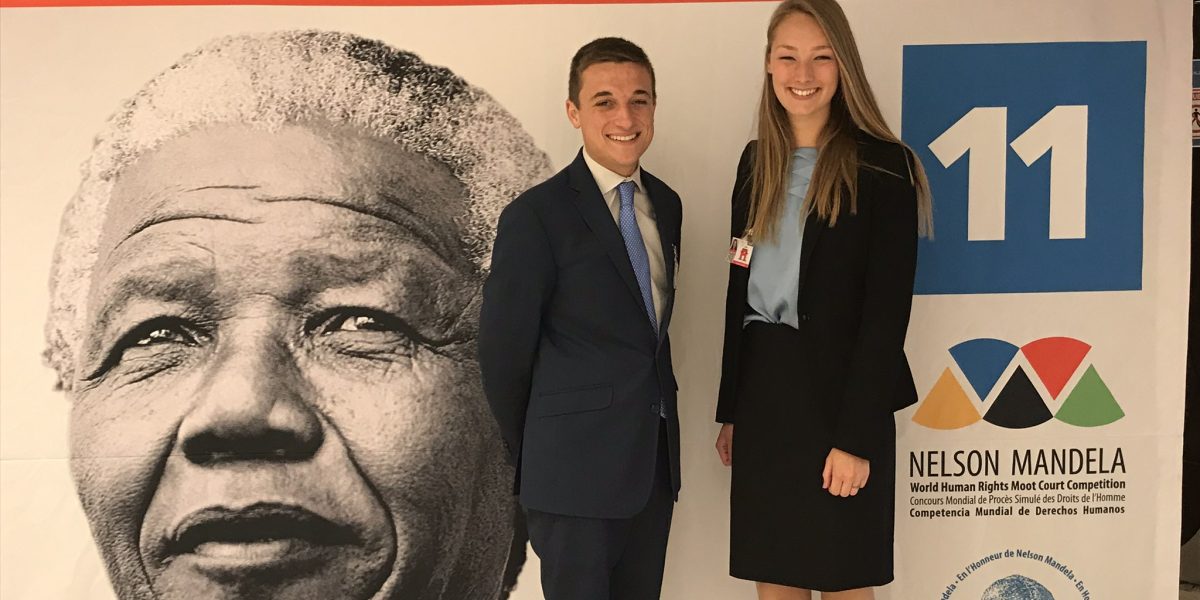Liberty students travel to Switzerland to compete at the Nelson Mandela World Human Rights Moot Court Competition

Alyssa Rumbuc stood at a podium in a circular room with light wood walls and a beige carpet. She could see her teammate, Tyler Shannon, and her coach, Dr. Robert Robertson, on her side. Behind her, a large window opened up to a panoramic view of the Alps, and directly in front of her sat a panel of judges from all over the world. After months of preliminary research, Liberty University’s two representatives at the competition snagged third place at the Nelson Mandela World Human Rights Moot Court Competition.
Moot court competition differs from mock court competitions. Moot court recreates an appellate court rather than a trial court experience, so the typical elements of trial court like witnesses, testimony, the introduction of new evidence and a jury are missing. Instead, the competitors present their arguments before a panel of judges.
“There’s an attorney with a panel of judges. You have a set of issues … dealing with human rights and you’re arguing on either side of that issue,” Shannon said, a Liberty University graduate currently studying law at George Mason University. “For the competition you have to prepare arguments for both sides, and as you’re arguing, you’re fielding questions from judges.”
While the actual competition in the United Nation’s headquarters in Geneva, Switzerland, was intimidating enough for both Shannon and Rumbuc, the large amount of research that needed to be done prior to the international competition was the real challenge.
“The real kicker here was that a lot of research had to be done, not just to understand the substantive portions of the argument, but the procedural aspects as well,” Dr. Robertson, the chair of the pre-law program who coaches the moot court team, said. “It required that we learn and understand the procedures and the rules that apply to the international human rights courts that exist, which we’ve never addressed on the undergraduate level.
Before the competition, neither Shannon nor Rumbuc had dealt directly with international law. While Rumbuc said the preliminary research felt fairly mundane, the preparation was worthwhile as soon as the news arrived in May that they would be taking a trip to Switzerland this summer upon approval of their briefs.
“Actually getting there was incredible because all the time and energy we spent preparing began to pay off very quickly,” Rumbuc said. “The location made the competition for me … the fact that we were in the U.N.”

COMPETE — The team left Geneva with third place.
With Lake Geneva to the east and the Alps within sight from almost any vantage point, Liberty University’s moot court team could not ask for a more idyllic place to compete.
“Certainly, it’s not anything you think about going to the U.N. to compete at 23 years old,” Shannon said, who had never traveled to Europe before. “Geneva is a gorgeous place, right on the lake at the Alps…. I’m very thankful and appreciative that Dean Miller worked hard to get us the funding.”
By the end of the multi-day competition, Liberty University scored third place, as well as being the only undergraduate team to reach the semifinals.
However, competing was not all the team did to open them up to new perspectives on law. Deeper discussions with their competitors also proved to be enlightening.
“It’s sort of odd,” Shannon said. “You’re all coming over there from different scenarios in life, but you’re arguing the same cases and the same issues…. It gives you a broader perspective that there are other people out there interested in the same things and working hard to pursue the same interests.”
Both Shannon and Rumbuc hope their performances at the competition will broaden Liberty University’s scope into more international arenas.
“The conversations and the chance to interact with people from all different walks of life was very valuable – everyone was extremely friendly,” Rumbuc said. “I think that when we go back, we’ll be able to pick up some of those relationships, and hopefully Liberty is able to continue to build relationships with the administrators and other universities connected to the competition.”
